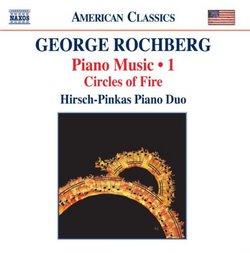Challenging and Rewarding
George Grella | Brooklyn | 03/25/2010
(4 out of 5 stars)
"This is fascinating, involving music from a unique and important composer. Rochberg was a 12-tone ideologue before personal tragedy moved him into a highly expressive idiom. His music makes use of whatever means and style is the one he needs at that moment, but it's not pastiche. You hear his skill, craft, the tradition of classical music that came before, and especially his emotional power and urgency. This work is long, involved and involving, not for background listening. It is an existential exploration of the human ability to persevere in trying times; the music is forceful, unsettling, beautiful and satisfying in turns. Rochberg synthesized a vast body of ideas about life and art, combined them with his great skill as a composer and focussed taste as an artist, and made compelling piece. This is music that is challenging but not daunting and an involving, deeply rewarding experience."
Thank you Naxos
Discophage | France | 03/08/2010
(5 out of 5 stars)
"Thanks to Mr Friedman for calling my attention on this reissue, and thanks to Naxos for making this rare material available again. It was originally produced by Gasparo. Not likely to attract many buyers, but still, fine music. George Rochberg's Circles of Fire for two pianos is an important and superb composition, in some ways reminiscent of Messiaen's Visions de l'Amen, and not only by dint of its same instrumental ensemble.
The "Circles of Fire" of the title are, to make it short, those of the creative imagination, deriving from and mirroring, in Rochberg's own words, "the universal fire that makes solar systems and galaxies, asteroid belts and comets, huge orbiting spirals, circles, loops that bend back on themeselves in giant symmetries and stream out across millions of miles in giant asymmetries", and "music is the perfect expression of this utterly fantastic image".
It was written in 1996-97 for the Hirsch-Pinkas piano duo (made of husband and wife Evan Hirsch and Sally Pinkas) who plays it here. It is then a late work in Rochberg's output, and a summation of his compositional style(s). It doesn't have the stylistic unity and uniqueness of Messiaen's Visions de l'Amen or Crumb's Makrokosmos III & IV. On the contrary, it is very "polystylistic", even somewhat derivative in some of the movements (Messiaen's stellar vistas come to mind, Schoenberg's austro-German expressionism in some others, and some sound like a pounding cross-breed of Antheil and Bartok gone mad). But that doesn't lessen its impact and value to my ears. My only quibble is with the extended (and, to my ears, overdrawn) elaboration on two themes from Brahms' First Clarinet Sonata and his Intermezzo for piano opus 118/4, played at half the speed, which make up the 9th movement Sognando (Dreaming). I find it stylistically jarring, an some "odd-piece out" in a stylistic universe in which it doesn't chime. Maybe it is because Rochberg hasn't transformed these themes enough and metabolized them into a language fully his own.
But despite my reservations about the Brahms quotations, this is an important statement and a moving testimony. TT 70+ minutes.
See my review of the original Gasparo release for more details: George Rochberg: Circles of Fire."


 Track Listings (15) - Disc #1
Track Listings (15) - Disc #1